Literary Retreat is pleased to publish the following interview with Ariel Powers-Schaub who has written the non-fiction book Millennial Nasties: Analyzing a Decade of Brutal Horror Film Violence. The analyses range from famous franchises such as Saw and Hostel to more obscure ones like Repo! The Genetic Opera.
Q1. Hi Ariel, it’s wonderful to have you with us for this interview. Please tell us about your humble beginnings as an author.
I’ve always enjoyed writing – English was my strongest subject in school, and I dabbled with different kinds of writing throughout high school and college. I started film analysis in 2021. During pandemic lockdowns, I was rewatching the Saw franchise a lot. I had a few ideas about themes and messages in the films that I wanted to explore further. I searched the web, but I couldn’t quite find the analysis I wanted, so I started writing, just to get my thoughts in order. It turns out I had something on paper I was pretty proud of, and this lined up with the launch of Ghouls Magazine. They accepted my pitch, and it grew from there. I wrote a ton for Ghouls, which just recently had to close down, sadly. I wrote for other outlets as well, such as Hear Us Scream, Certified Forgotten, and Moving Pictures Film Club.
Q2. I loved reading your book, Millennial Nasties (2024). Could you give us a brief overview about your work?
Thank you for the kind words! Millennial Nasties started out as a different project, because I originally thought I might write a book about the Saw franchise. But the more I wrote, the more I realized I wanted to talk about other films of the era – films influenced by Saw, and the subsequent films that influenced more films, and how the era grew over time. I had a rough idea of what I wanted to write, but I needed to pick a focus. I started rewatching as much 2000s horror as I could, and looking for similar themes. A lot of writing Millennial Nasties was watching the films I call “millennial nasties.”
As I narrowed down which films I wanted to cover, I took copious notes, and arranged them into chapters, Millennial Nasties took shape. The name came much later. I decided to pitch to Encyclopocalypse Publishing when the book was about one-third or one-half written. I polished up a few sample chapters and sent them with my query letter.
Q3. I know you touched upon this subject in your book, but why did you opt for a non-academic approach to the topic?
I want Millennial Nasties to be for everyone. Accessibility was a goal. I want this book to be enjoyed by academics, non-academics, horror fans, people who hate horror, people who have never seen a horror film, etc. That might be a stretch, but I wanted everyone to feel welcome to read if they were interested.
Q4. Who are your favorite writers?
Stephen King has always been a part of my life, and I am almost always re-reading a book of his. Some of my other favorite fiction authors lately are C.J. Tudor, Catriona Ward, Riley Sager, and Grady Hendrix.
Q5. Please list your top 5 favorite horror films.
This is a nearly impossible question to answer! I love so many horror films. But if I had to narrow it down:
- The Blair Witch Project (1999)
- Saw (2004)
- The Texas Chain Saw Massacre (1974)
- Scream (1996)
- Hereditary (2018)
Q6. Any tips for aspiring authors?
It’s a cliche for a reason: to be a writer, you have to write. Write what you want, when you want, to your heart’s content, and you’re a writer.
What you want to happen with that writing might mean you need to take some additional steps. This is my first book, so I know I still have a lot to learn. But I can share what worked for me, and maybe it will help others.
- Talk to other authors. Be bold on social media, put out a call for advice, ask a mutual friend to introduce you, whatever you have to do to get some Q&A with people who have done the thing you want to do. You might hear contradictory advice, but that’s okay, just be a sponge and listen and soak up what you can.
- Google a lot, of course. Again, you will find contradictory information, but you will likely be able to figure out what applies to you.
- It seems like nonfiction and fiction publishing have different processes – at least, that’s what I found in my googling. Make sure you look for advice for your type of writing.
- Research the pros and cons of working with a publisher and self-publishing.
- You probably need to carve out time for writing.
- You need to pitch. Find the process for the place you want to pitch to, and follow their directions over any other advice you may have heard.
Q7. Please inform us about your upcoming projects.
I regularly contribute to The Pod and the Pendulum podcast, on which we cover horror movie franchises one movie and one episode at a time. We have several franchises to cover in 2024 which I am looking forward to. We’re covering franchises that don’t get much coverage on other pods, and we back every episode with a ton of research.
I am currently pitching writing to a few different horror sites, so watch my social media for my upcoming published writing! @Ari_Hellraiser on Twitter and Instagram.


